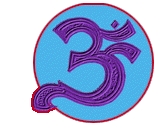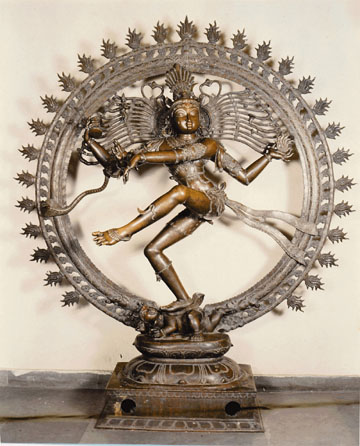Syllabus for INST 380:
HUMAN NATURE IN WORLD
RELIGIONS AND PHILOSOPHIES
Spring term, 2006
Day Section (-01)
(Revised and Official as of 4/02/06)
Dr. Paul A. Laughlin, Instructor
Office: Towers 322 -- Office phone: 823-1510
Office Hours: 11-11:50 a.m. (TTh)E-mail: plaughlin@otterbein.edu
DESCRIPTION OF COURSE
This course is an examination of human nature from the standpoint of the world's great religious traditions. After initial considerations of the concept of religion itself, as well as some attention to pre-historic, non-literate, and tribal (e.g., African) religions and Western religious traditions (e.g., Judaism and Islam), the course will then focus on the less familiar major religions of South, East, and Southeast Asia (i.e., those originating in India and China): Hinduism, Buddhism, Confucianism, and Taoism. Throughout the course, the views of these "exotic" religious traditions regarding human nature and related matters will be compared and contrasted with those of the Judaeo-Christian tradition, which serves as the norm for most American religious experience, belief, thought, and practice.
The format of the course will combine lectures, multimedia presentations, and in-class discussion, with outside readings.
COURSE OBJECTIVES
The principal goals of the course are:
(1) to convey an understanding of religion in its broadest generic sense (i.e., beyond this or that particular religion, sect, denomination or cult), and of the incredible diversity of beliefs and practices that are covered by the terms "religion" and "religious" in that comprehensive sense;
(2) to provide an overview of the history of religions, indicating where the world's great religions fit, both chronologically and typologically;
(3) to distinguish between Western and Non-Western patterns of religious thought, especially as regards human nature and related issues;
(4) to demonstrate how the major religions of southern and eastern Asia fit and exemplify the Non-Western pattern, and thus contrast with the Western religions with which most Americans are more familiar;
(5) to instill a working knowledge of the cultural contexts in which the Non-Western religions emerged and flourished, as well as a familiarity with the languages in which the actual terminology of each religion was framed;
(6) to assist the participants in clarifying their own religious (and/or philosophical) perspectives as well as their understandings of human nature in light of the many options available among the world's religious traditions, and especially the Non-Western.
All Integrative Studies courses are designed to help students to):
1. understand human nature and the many facets of our being more fully;
2. think critically and creatively;
3. communicate their thoughts accurately and effectively in writing and
speaking;
4. develop competencies in a broad range of disciplines in the liberal
arts and sciences;
5. make integrative connections across disciplines, and to
engage complex problems with interdisciplinary knowledge;
6. identify their beliefs and extend their knowledge of ethical and
spiritual issues to create a broader understanding and tolerance;
7. know how to access and evaluate information, resources, and
technology and apply them in the appropriate context.
No INST course addresses all of these to the same extent, but INST 380 is designed to speak to as many as possible. The major issues addressed in the course have marked implications for understanding human nature, and attempts to approach that theme critically and creatively. (Goals 1 and 2.) Given the complexity of the subject of religion itself, the academic study of it is quintessentially interdisciplinary (Goal 4), and INST 380 makes explicit connections with other disciplines as a matter of routine (Goal 5). So encompassing is the purview of INST 380 and so many are the connections with disciplines beyond religion or philosophy, in fact, that many students have come to regard it as a kind of informal capstone to much of what they have learned previously in the Integrative Studies sequence. Perhaps the most addressed goal in INST 380, however, is number 6, for it approaches all of the major world religions and any philosophies that they generate both critically and sympathetically, as noble traditions that deserve both respect and intelligent reflection that asks serious questions. The least addressed goals in INST 380 are the third and seventh, largely because of the size of the classes and the format of the course, which make lengthy and frequent writing assignments, student presentations, and extensive research projects impractical.
REQUIREMENTS
(1) Class Participation -- Regular attendance at all class sessions is expected, and contributions of thoughtful questions and comments are always welcome and encouraged. Attendance will be taken and absences will have a negative effect on the "Participation" portion of the course grade. (See below.)
(2) Reading -- There are four required textbooks for this course (all available in the Otterbein Bookstore and elsewhere):
Eric Butterworth, Discover the Power within You:These texts will be assigned, for the most part, according to a set schedule (see below), and are to be read by the Thursday class session of the week for which they are designated (which is to say, "in advance"). A few other short readings may be assigned from time to time throughout the course. Note: you typically will be quizzed on assigned readings before they are covered in class.
A Guide to the Unexplored Depths Within
(HarperSanFrancisco, 1992)
Thich Nhat Hanh, Peace Is Every Step (Bantam, 1991)
Benjamin Hoff, The Tao of Pooh (Penguin, 1982)
Paul Alan Laughlin, Getting Oriented: What Every Christian
Should Know about Eastern Religions, but Probably
Doesn't (Polebridge Press, 2005)
Lao Tzu, Tao Te Ching (handout)
Tammy Immell, Integrative Studies Reader (McGraw-Hill
Custom Publishing, 2004)
Readings in Zen (hand-out)
The Upanishads (selections -- handout)
Laughlin, "Judaism and Islam" (handout)
(3) Quizzes -- There will be five short (30-minute) objective-type (multiple-choice, fill-in, etc.) quizzes at the beginning of the Thursday class in Weeks 2, 4, 6, 8, and 10. Unless otherwise specified, each quiz will cover the materials from lectures from, and assigned readings since, the previous session. Only the three highest of the first four of these grades will figure in the final course grade, but the last quiz of the term will count for everyone.
(4) Reading Notebook-Journal -- Each student will keep a reading notebook-journal based mainly on Laughlin's Getting Oriented and Butterworth's Discover the Power within You. For the Butterworth book, the student should write a 1250-1500-word summary and critique (positive or negative) of the author's thesis and principal ideas. For Laughlin's book, the student should answer a minimum of two of the numbered "Questions for Reflection and Discussion" contained at the end of each chapter, but as many others as he/she wants. In addition, the student should write reflections on information or ideas found in as many of the other readings and lectures as possible, as well as on other things that relate to the course (e.g., TV shows, movies, ads, cartoons, music, etc.) The notebook will be evaluated on the basis of how numerous, extensive, deeply thoughtful, creative, and stylishly written the entries are. It is highly recommended that the notebook be done throughout the term rather than at the very end, and that they be done in Word, so that they may be revised and edited as if for publication. Due time/date: when the take-home final is due (see below).
(5) Exam -- There will be one exam, a take-home, open-book, open-note, essay-type final, distributed at the last class session and due back by the end of the regularly scheduled time for the final exam (also non-negotiable). The means/place for returning the completed exam will be specified on the exam prompt distributed in class at the final session.
(6) I. S. Public Events Attendance -- Each student will be required to attend four campus events drawn from this on-line list: http://ocapps.otterbein.edu/arts_lectures. (Dr. Laughlin may identify and approve other such arts--music, theatre, and visual art--in the course of the term.) Proof of attendance at the four required events will consist of a one-page (typed, double-spaced) reaction paper with a program for the event attached and signed by any faculty member in attendance. (Dr. Barkhymer, I.S. Chair, is at most of these and will be happy to accommodate requests for autographs, as will most faculty members) These will be turned in at the end of the term (with the take-home final), so guard them with your lives! One full letter grade will be deducted in the area of "Participation" (see above) for each event not reported and documented.
[Rationale for this program-wide requirement, as stated by Dr. Barkhymer: "Attendance at cultural, intellectual, and informative events is one defining habit of the educated person. By fulfilling an attendance requirement you rehearse that habit, and you can contribute to the critique and discussion that builds a vigorous community among students, faculty, staff, and administration of the college. One aspect of Integrative Studies is putting things together from many disciplines, crossing boundaries. It's not unexpected to encounter material that doesn't directly pertain to the main focus of a course."]
FINAL GRADES FOR THE COURSE WILL BE BASED ON THE INSTRUCTOR'S EVALUATION OF THE STUDENT'S (1) OVERALL PARTICIPATION, INCLUDING ATTENDANCE; (2) QUIZZES; (3) READING JOURNAL; AND (4) FINAL EXAM. Equal weight (25%) will be given to those four items in determining the final course grade.
NOTE: The "Participation" portion of the final grade will be figured as (a) the average of the sum of the quiz score average and the Notebook- Journal grade, PLUS OR MINUS (b) up to 10 "Class Points" for such things as attendance, alertness in class, and active participation. Example: if you got a 75 average on the quizzes and an 85 on your notebook- journal, for an average of 80, and had perfect attendance, stayed on task (versus napping, catching up on your reading or written work, talking with your neigbors--or on the cell phone!--breezing in and out for drinks of water and/or food) and regularly raised excellent points or questions--enough to earn a full 10 points--you would wind up with a 90 (A-) for "Participation." If, on the other hand, you earned a 95 on both the averaged quizzes and the Notebook- Journal, but missed every class, you would get a minus 10 for "Class Points," which would drag your "Participation" average down to an 85 (B). [NOTE: These "Class Points" are not averaged in with your Quizzes and Notebook- Journal to determine "Participation," but added on to the average of those two, which makes them extremely valuable!] Here is the range "Class Points" Scale:
No or one unexcused absence, always attentive, regularly participatory: +10 points
Two unexcused absences, but otherwise attentive, regularly participatory: + 8 points
Two unexcused absences, attentive, but quiet, polite, and passive: +6 points
[NOTE: The good news here is that if you are a good-to-excellent, but
shy-and-quiet student, you not only will not be penalized; you will be
rewarded for your relatively passive in-class participation. For
example, if you fall into this category, and wind up with an 84 or 85
average on your quizzes and notebook-journal, you could still wind up
with an A- (90 or 91) in Participation. Added to an 88 or 89 average
on quizzes and note-journal, however, those 6 points would give you
a solid A (94 or 95) in Participation.]
For every unexcused absence beyond two, subtract 2 points from the above +8, down
to a maximum of -10 (which would be total of 11 unexcused absences) and give
yourself no points for attentiveness and activity when you are in class. [Rationale:
If you are routinely missing class, you haven't established enough continuity or
credibility for your question or comment to be worth much. Put more bluntly: don't
think you can breeze into class from time to time, impress the instructor with your
interjections, and be rewarded for "Participation" despite your poor attendance
record.] For every act of rudeness (e.g., whispered conversations, napping, doing
other assignments, disrespect, etc.), subtract one point up to a maximum of -20 (or,
in the case of tardiness, 1/2 point).
Other than the case of the "Course Points" just explained, a standard 100-point scale will be used throughout the course. On items of coursework assigned a letter grade rather than a number grade (e.g., overall participation), a straight letter grade will be figured at mid-range (e.g., B = 85, C = 75, etc.), a "+" or "PLUS" grade will be figured at the very upper range (e.g., B+ = 89, C+ = 79, etc.), and a "-" or "MINUS" grade near the lower range (e.g., B- = 81, C- = 71, etc.).
EXTRA CREDIT: A student may earn up to 5 points, added onto the final course average (that is, a half-letter grade for the course), by attending a regularly scheduled service of Jewish, Muslim, Hindu, or Buddhist worship and/or meditation and submitting (at the end of the course) a two-page (500-word) description of and reflection on the experience. Points will be determined solely on the quality of the written report: 5 = excellent, 4 = good, 3 = adequate, 2 = substandard, 1 = poor, 0 = no real evidence of the experience.
ANY ACT OF ACADEMIC DISHONESTY WILL BE GROUNDS FOR FAILURE OF THE ENTIRE COURSE, AND WILL BE REPORTED TO THE DEAN OF ACADEMIC AFFAIRS FOR POSSIBLE JUDICIAL ACTION, IN ACCORDANCE WITH OTTERBEIN COLLEGE POLICY.
COURSE SCHEDULE AND OUTLINE
NOTE 1: Much of this course will be Internet-based. Specifically, I have posted class notes, study guides, and other helpful materials at this address:
NOTE 2: Laughlin's Web-based course notes should be downloaded and printed out, and at least skimmed before bringing them to class. Students will not be quizzed on these notes until they are covered in class. (You may, however, be quizzed on the assigned readings before the topics contained in them are covered in class.)
NOTE 3 : The reason that you may be quizzed on readings on topics not yet covered in class is that the schedule is designed to have you reading ahead of class lectures, in order to give you some background to build upon in class. The working assumption here is that college juniors and seniors should be able to learn from reading on their own, especially in light of the detailed study guides provided.
Weeks 1 & 2 (March 27-April 7):



I. Introduction: Definitions and
Historical Background
Reading: Getting Oriented, Introduction & Chapter One; Laughlin's
hand-out on Judaism and Islam; "Religion from an African
Perspective" in Integrative Studies Reader.
Writing: Work on reading journal questions (and any additional
reflections) for the assigned chapter and any other course
materials you wish to include.
Printing: http://www.otterbein.edu/dept/RELG/INST380NOTESII-F03.html.
(Look these over and bring them to class.)
Weeks 3 & 4 (April 10-21):




II. The East-West Game: Oriental vs.
Occidental Religions
Reading: Getting Oriented, Chapter Two; Butterworth, all;Upanishads hand-out.
[Note: Using the built-in study guide for the Upanishads, pay attention to
what each specified passage says about the listed topic.]
Writing: Work on reading journal questions (and any additional
reflections) for the assigned chapter and any other course materials
you wish to include.
Printing: http://www.otterbein.edu/dept/RELG/INST380NOTESIIIa-F03.html.
(Look these over and bring them to class.)
Weeks 5 & 6 (April 24-May 5):




III. Religions Originating in India:
A. HinduismReading: Getting Oriented, Chapter Three; Hanh, all; Zen hand-outs.
Writing: Work on reading journal questions (and any additional
reflections) for the assigned chapter and any other course
materials you wish to include.
Printing: http://www.otterbein.edu/dept/RELG/INST380NOTESIIIb-F03.html.
(Look these over and bring them to class.)
Weeks 7 & 8 (May 9-19):




III. Religions Originating in India:
B. Buddhism
Reading: Getting Oriented, Chapter Four; Tao Te Ching (hand-out);
"The Question of King Milinda" in Integrative Studies Reader
Writing: Work on reading journal questions (and any additional
reflections) for the assigned chapter and any other course
materials you wish to include.
Printing: http://www.otterbein.edu/dept/RELG/INST380NOTESIIIc-F03.html.
(Look these over and bring them to class.)
Weeks 9 & 10 (May 23-June 2):



IV. Religions of China: Taoism &
Confucianism
V. World Religions & You
Reading: Getting Oriented, Chapter Five and Conclusion; Hoff, all
[Note: Pay special attention to Hoff's definitions of Tao, Tsu-jan,
or "Inner Nature," P'u and wu-wei. What does he mean by
"Bisy Backson," and what does that term have to do with
(a) Confucianism and (b) you?]
Writing: Work on reading journal questions (and any additional
reflections) for the assigned chapter and other course materials.
Printing: http://www.otterbein.edu/dept/RELG/INST380NOTESIV&V-F03.html.
(Look these over and bring them to class.)
